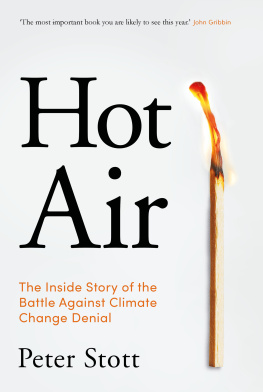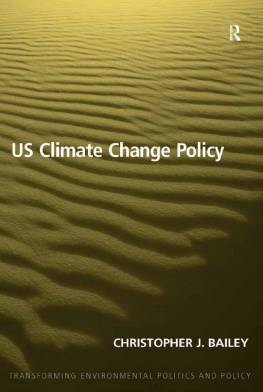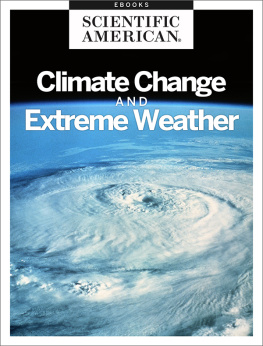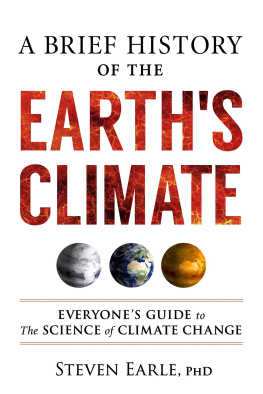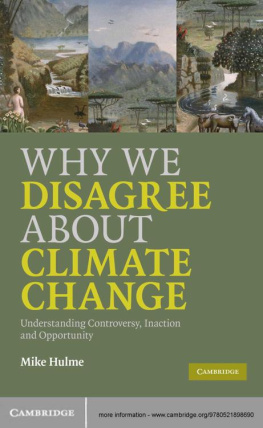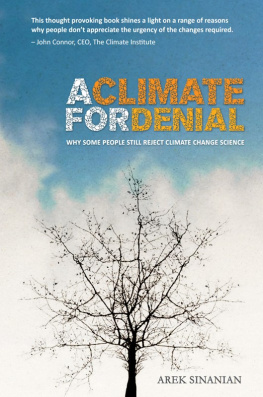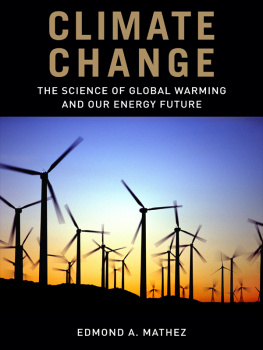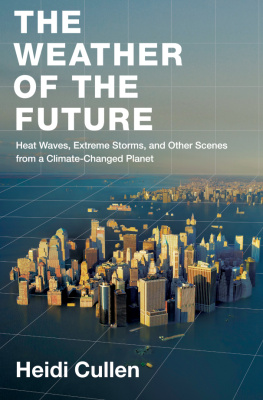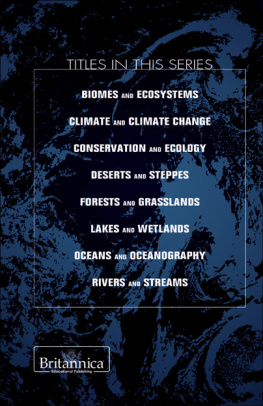Contents
Guide
Hot Air
THE INSIDE STORY OF THE BATTLE AGAINST
CLIMATE CHANGE DENIAL
Hot Air is a compelling indictment of the people and organisations that, for whatever reason, refuse to accept the evidence of human-induced global warming. The scientific case for this has been clear for more than thirty years. It is disappointing that there is still a need for this book, but gratifying to find such a clear exposition of the science and the politics. The most important book you are likely to see this year.
John Gribbin, author of In Search of Schrodingers Cat
Gripping, urgent and human... Stott provides a unique eye-of-the-storm perspective on the story of the century.
Leo Hickman, director of Carbon Brief
In todays world climate scientists dont just do science. As Peter Stott reveals in this extraordinary story, over recent years climatologists have also had to do battle with fossil fuel-financed deniers with a dark and dangerous agenda that of blocking international action to tackle the most pressing crisis of our times, global planetary heating.
Mark Lynas, author of Six Degrees
This important book lays out many of the stories behind the most important science in human history: the effort to prove, against the well-funded denialists and vested interests, that the planet was heating, that humans were responsible, and that we better take swift action. If there are historians around someday to tell this epic story in all its complexity, they will lean heavily on this account.
Bill McKibben, author of Falter
Peter Stott is a Science Fellow in Climate Attribution at the Met Offices Hadley Centre and Professor in Detection and Attribution at the University of Exeter. He has played a leading role in the United Nations Intergovernmental Panel on Climate Change and has been published in Nature and Science, among many other journals.
Hot Air
THE INSIDE STORY OF
THE BATTLE AGAINST
CLIMATE CHANGE DENIAL
Peter Stott

Published in hardback and trade paperback in Great Britain in 2021 by
Atlantic Books, an imprint of Atlantic Books Ltd.
Copyright Peter Stott, 2021
The moral right of Peter Stott to be identified as the author of this work has been asserted by him in accordance with the Copyright, Designs and Patents Act of 1988.
All rights reserved. No part of this publication may be reproduced, stored in a retrieval system, or transmitted in any form or by any means, electronic, mechanical, photocopying, recording, or otherwise, without the prior permission of both the copyright owner and the above publisher of this book.
Every effort has been made to trace or contact all copyright holders. The publishers will be pleased to make good any omissions or rectify any mistakes brought to their attention at the earliest opportunity.
10 9 8 7 6 5 4 3 2 1
A CIP catalogue record for this book is available from the British Library.
Hardback ISBN: 978 1 83895 248 8
Trade paperback ISBN: 978 1 83895 249 5
E-book ISBN: 978 1 83895 250 1
Printed in Great Britain
Atlantic Books
An imprint of Atlantic Books Ltd
Ormond House
2627 Boswell Street
London
WC1N 3JZ
www.atlantic-books.co.uk
To Pierrette
Contents
Prologue
16 March 2017
A pproaching the closing moments of our annual scientific meeting I find myself getting emotional. Together with colleagues from the International Detection and Attribution Group, Ive spent the last three days dissecting our latest research into the earths changing climate. Our results are not reassuring: unprecedented heatwaves, more devastating storms, rapidly melting ice all, we have found, are attributable to human-induced greenhouse gas emissions. Its a sobering picture. But the research itself is not why Im feeling increasingly distressed. There is still time just to avert global environmental catastrophe, as long as governments take our findings seriously. The problem is, Im hearing, theyre not.
One government in particular is, once again, disputing our science. It is the most powerful nation on earth, home to over 300 million people and our host country today. Two months ago, Donald Trump was inaugurated as US president, pledging to withdraw from the international Paris Agreement to tackle climate change, and installing Scott Pruitt as head of the countrys Environmental Protection Agency. Pruitt, a man well known for working with oil and gas companies to challenge environmental regulations, rejects the scientific consensus on climate change. Like the rest of my colleagues here, I am well aware that these are outrageous falsehoods.
For over twenty years, I have been a member of the International Detection and Attribution Group, a small band of twenty or so researchers from around the world whose quest has been to establish the causes of climate change. I know how significant these findings and those of my colleagues are. Thats why what Im hearing today makes me feel so angry.
Im ignoring the arresting view from our seminar room at the Berkeley Lab, a complex of multi-storey buildings perched on a steep hillside above the campus of the University of California, Berkeley: the glittering waters of San Francisco Bay, the Golden Gate Bridge, the rocky fortress of Alcatraz. Instead, Im watching three large television screens arrayed across the front of the room on which our speaker, Ben Santer, is presenting illustrative slides. We could all be downtown by the Wharf, eating seafood in the warm sunshine, chatting about our families ahead of our travel home. But were still here, in these closing moments of our annual gathering. Were keen to hear what he has to say, the colleague who more than twenty years ago kick-started this obscure, life-changing, bitterly controversial scientific field of ours. We want to know how Ben is fighting back against the lies being spread, once again, about the discoveries weve made, discoveries which affect all life on earth.
Ben is one of the founding members of our group, which was established in 1995. He has made a string of groundbreaking discoveries, including detecting the fingerprints of human activity in atmospheric temperatures, water vapour and ocean heat content. But today he is feeling too stressed to travel the forty or so miles from his office at the Lawrence Livermore National Laboratory to join us in person. Instead he is presenting his talk remotely, his voice coming to us, like a pained but determined spirit, from speakers hidden in the ceiling.
Ben knows how strong the evidence is for human-induced climate change. Over more than two decades, he has gone out of his way to explain to government officials, politicians and the media why we know that greenhouse gas emissions have caused global warming and why it matters. For his trouble, he has been accused of fraud, threatened with the sack, and charged with betraying his fellow citizens. Hes been through tough times before. But now, after all this time, and as the consequences of further delay in tackling the climate crisis become ever more stark, it feels like this latest attack, by the man in charge of his countrys environmental protection, is the worst of all.
Calmly, but with restrained fury, Ben tells us how he has gone about assessing Pruitts claim that, over the last two decades, atmospheric temperatures measured from satellites have not increased. It fits the bill, Ben explains, for what is known in science as a testable hypothesis. It doesnt go against the scientific grain to make a supposition, no matter how outlandish. But for a supposition to have any validity as a scientific hypothesis, it must stand up to testing against observed reality. Although its a test that Pruitt has no interest in carrying out, Ben has gone to the trouble of doing so himself.

